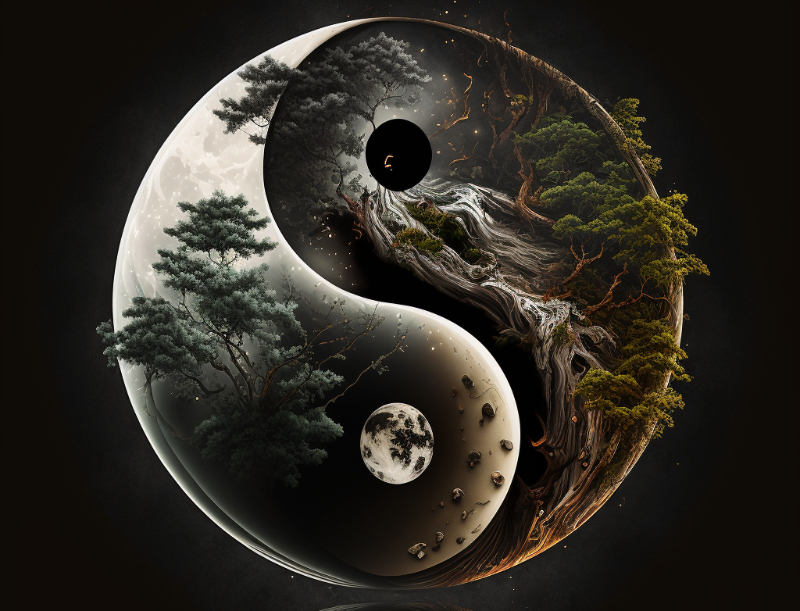Wu Wei and Western Philosophy: How Non-Action Relates to Stoicism and Existentialism

In this post I delve into the Taoist philosophy of Wu Wei and its relationship to Western philosophy. We’ll be explore how the concept of non-action, or Wu Wei, is related to two major Western philosophies: Stoicism and Existentialism.
What is Wu Wei?
Before we dive into the Western philosophies that relate to Wu Wei, let’s first understand what Wu Wei means.
Wu Wei is a concept from Taoism, a Chinese philosophy that emphasizes the importance of living in harmony with nature. At its core, Wu Wei means “non-action” or “effortless action”. It’s the idea that we can accomplish more by doing less, by allowing things to happen naturally rather than forcing them.
Wu Wei is often associated with the concept of flow, where we become so fully engaged in an activity that we lose track of time and effortlessly accomplish our goals. It’s about letting go of our desire for control and trusting in the natural flow of things.
Stoicism and Wu Wei
Stoicism is a Western philosophy that originated in ancient Greece and has since influenced many other schools of thought. At its core, Stoicism is about accepting what we cannot control and focusing on what we can control. It’s about living a life of virtue, wisdom, and self-control.
When we compare Stoicism with Wu Wei, we can see some similarities. Both philosophies emphasize the importance of letting go of our desire for control and accepting the natural flow of things. In Stoicism, this is expressed through the idea of amor fati, or the love of fate. It’s about accepting everything that happens to us, both good and bad, and seeing it as an opportunity to grow and learn.
Wu Wei and Stoicism also share the idea that we can control our own minds and emotions. In Stoicism, this is expressed through the idea of “apatheia”, or emotional detachment. It’s about recognizing our emotions but not letting them control us. Similarly, in Wu Wei, we practice non-attachment to outcomes and let go of our desire for control.
Existentialism and Wu Wei
Existentialism is a Western philosophy that focuses on individual freedom and the search for meaning in life. At its core, existentialism is about embracing our own existence and creating our own meaning in a world that may be meaningless.
When we compare existentialism with Wu Wei, we can see that both philosophies emphasize the importance of living in the present moment. In existentialism, this is expressed through the idea of “authenticity”. It’s about being true to ourselves and living our lives according to our own values, rather than conforming to society’s expectations.
Similarly, in Wu Wei, we let go of our desire for control and live in the present moment. We trust in the natural flow of things and allow ourselves to be fully present in each moment.
Wu Wei as a Bridge between Eastern and Western Philosophy
Wu Wei is a concept that can help us bridge the gap between Eastern and Western philosophy. It emphasizes the importance of living in harmony with nature, letting go of our desire for control, and embracing the present moment. These are all concepts that can be found in both Eastern and Western philosophy.
By understanding the similarities between Wu Wei and Western philosophies such as Stoicism and Existentialism, we can begin to see how different philosophies can complement each other. We can learn from the wisdom of different cultures and create a more holistic understanding of the world.
Conclusion
In conclusion, Wu Wei is a profound concept that has relevance not only in Eastern philosophy but also in Western philosophy. It is a philosophy that can help us live our lives more effectively and with greater ease.
By embracing the concept of non-action and living in harmony with the natural flow of the universe, we can reduce stress, improve our relationships, and find greater meaning in our lives.
To live a life of Wu Wei, we must learn to let go of our need to control everything and instead trust in the natural flow of the universe. We must learn to be present in the moment, to appreciate the beauty of the world around us, and to let go of our attachment to material possessions and external achievements.
By living a life of Wu Wei, we can find greater peace and happiness and live a life that is truly fulfilling.
So, embrace the philosophy of Wu Wei today and start living a life of non-action and flow. You’ll be amazed at how much more effortless and enjoyable your life can become.
As the famous Taoist philosopher Lao Tzu once said, “Nature does not hurry, yet everything is accomplished.” By living a life of Wu Wei, we can learn to accomplish everything we need to without rushing or struggling, and instead find peace and harmony in the natural flow of life.